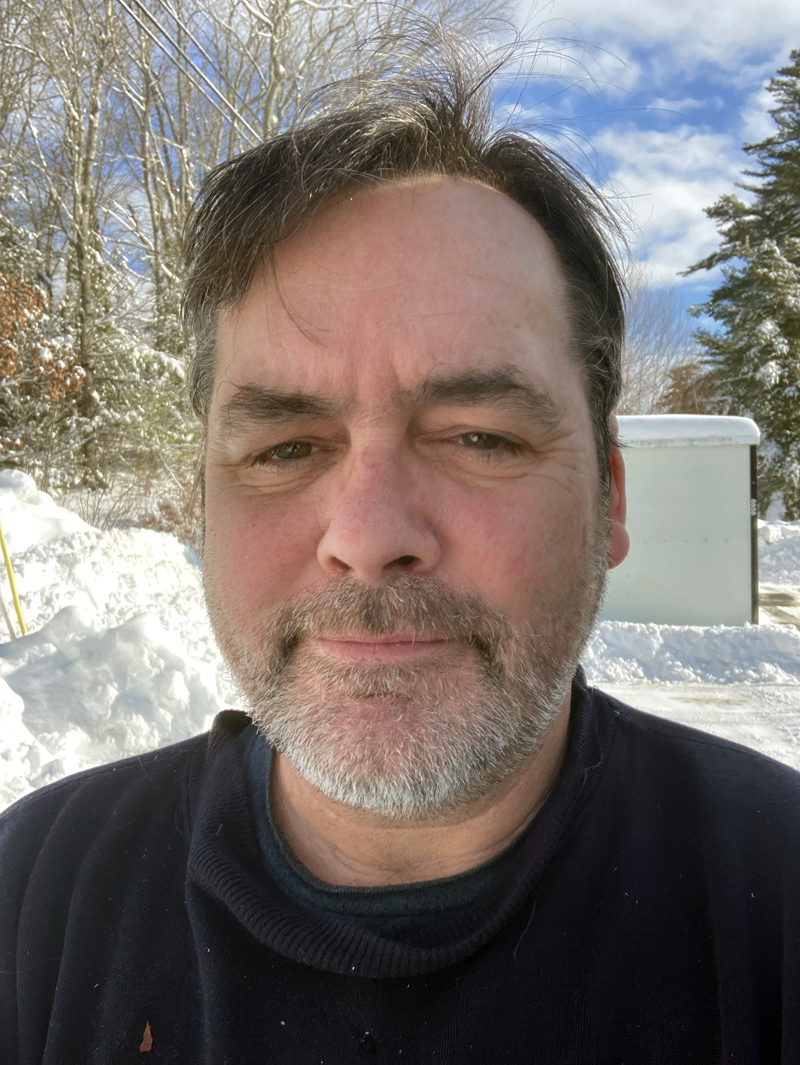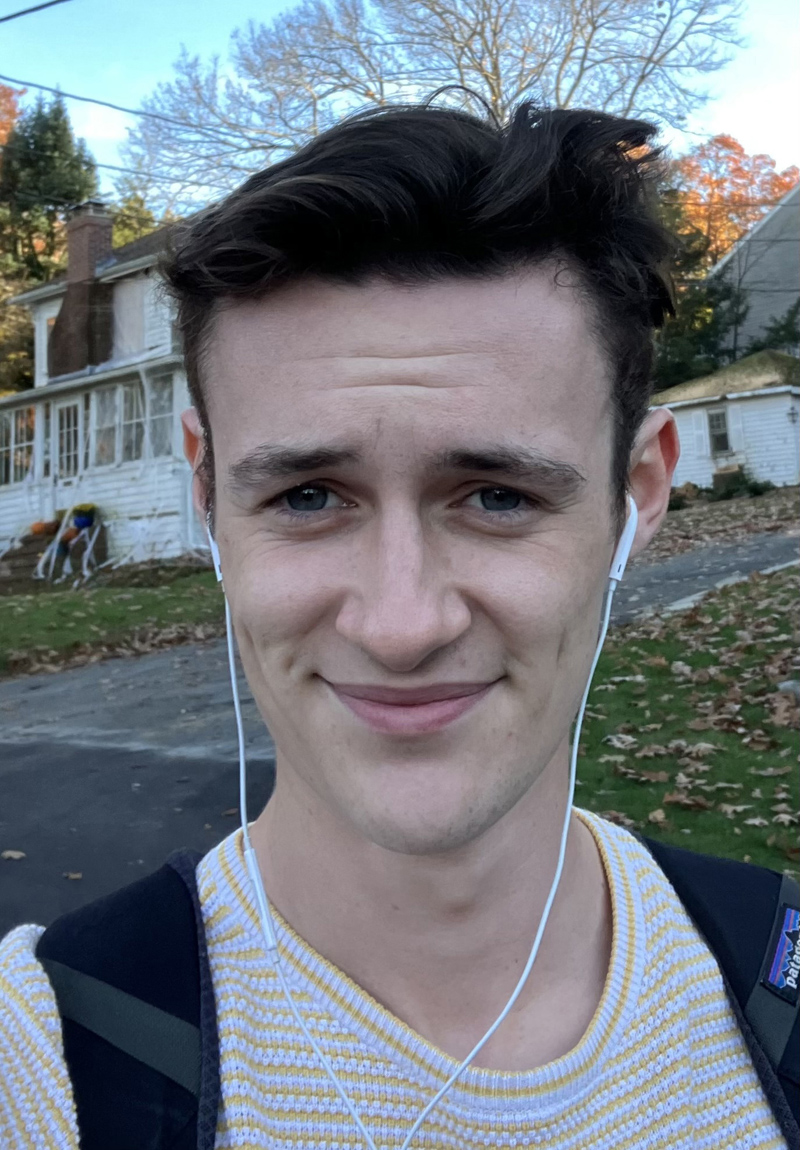
Bristol resident Todd Richards’ life was saved when his son, Sam Richards, was able to perform CPR and mouth-to-mouth resuscitation after removing a piece of steak from Todd’s throat on the evening of Jan. 3. (Photo courtesy Todd Richards)
Sam Richards knows the value of being trained in CPR and mouth-to-mouth resuscitation. On the evening of Jan. 3, he used these techniques to save the life of his father, Bristol resident Todd Richards, after Todd choked on a large piece of steak.
“This stuff is important to know. It can come out of nowhere, it can happen to anybody, and those five minutes are really all you got to make or break in some situations,” Sam Richards said. “Information can save lives, especially this information.”
Sam Richards told the story during a phone interview, explaining that the techniques he learned six years earlier — during lifeguard certification training class with Lori LaPointe at the Wiscasset Community Center — came right back to him like an instinct when he needed them most.
“Six-year-old knowledge that was never used can be really useful in the right situation,” Sam Richards said.
LaPointe has been teaching American Red Cross lifeguard classes for about 25 years. At least two or three times a year, she hears stories like the one Sam Richards told her, where the techniques taught in her class save lives.
“It’s very fulfilling when I have somebody like Sam Richards comes to me and says ‘Lori, this is what happened over Christmas break and I was able to remember what to do,’” LaPointe said. “In an emergency, you never know how someone’s going to react, but he reached from the resources he was taught and was able to save his dad’s life.”
Sam Richards was visiting his parents in Bristol, home from Brandeis University on his winter break, when he decided to cook a few steaks.
His dad being a “super-foodie,” Sam Richards made some extra, intending to share it. He gave his dad a piece and he liked it, so he cut a filet in half for him to enjoy.
Joking around in a bit of friendly father-son ribbing which is not uncommon for the pair, Todd Richards put the entire, approximately 6-ounce, piece of steak in his mouth, what his son referred to as a “baseball of steak.”
“My son and I always joke with one another about how much we can eat and my wife calls us the vacuums because we suck up all the leftovers at the end of every meal,” Todd Richards said during a phone interview.
Todd Richards said he soon realized while chewing that the piece of steak was bigger than he thought. He attempted to swallow a small piece he thought he broke off but “apparently the small piece was still attached,” and a bigger piece followed down his throat.
“I walked towards a doorway and made the symbol for choking on my throat and put my arms on either side of a doorway so he could do the Heimlich,” Todd Richards said.
When Sam Richards realized his father was choking and turning red, he began to perform the Heimlich maneuver, to no avail.
“After about five minutes of this, he loses consciousness, he loses air,” Sam Richards said.

Brandeis University student Sam Richards saved his father, Bristol resident Todd Richards, when he was able to perform CPR and mouth-to-mouth resuscitation after removing a piece of steak from Todd’s throat on the evening of Jan. 3. Sam Richards credits the lifeguard training from Lori LaPointe that he received at the Wiscasset Community Center when he was 16 for preparing him with the knowledge to save his father. (Photo courtesy Todd Richards)
Todd Richards fell down and caught himself on his right eye, giving himself a black eye and cutting his eyebrow open. At first, Sam Richards and his mother, Sarah Richards, did not know where the blood was coming from, which was a scary sight, he said.
This is where Todd Richards’ memory ends. According to him, he next remembers waking up with an emergency medical technician and his wife and son standing over him.
“And then I was on my back, talking to an EMT, in that order. It was one second he was doing the Heimlich, and I was on my back and the EMT was asking me some simple questions,” Todd Richards said.
After a “good amount of strength and effort,” Sam Richards rolled his father onto his back after Todd Richards passed out.
“I’m thinking at this point, I can provide a Heimlich from up top. But I need to get air into him, I need to start CPR,” Sam Richards said.
According to the Mayo Clinic, CPR, or cardiopulmonary resuscitation, is a lifesaving technique that’s useful in many emergencies, such as a heart attack or near drowning, in which someone’s breathing or heartbeat has stopped.
Sam Richards started CPR chest compressions because he wasn’t sure if he could hear a pulse, suspecting his father was medically dead at that point.
He also tried mouth-to-mouth resuscitation to get his father breathing again but he couldn’t get air down his trachea, or windpipe.
“There’s two things that they teach you in lifeguarding — which is always check the airway if you see somebody is chocking and CPR isn’t working and, if necessary, clear the airway,” Sam Richards said. “This is something, actually, Lori taught me specifically.”
Sam Richards had to tilt his father’s head all the way back and feel and look for a blockage.
Four minutes into Todd Richards not being able to breath and two minutes into him not being conscious, Sam Richards tried reaching down his father’s throat to retrieve the piece of steak that was blocking his throat.
“I couldn’t reach it for a little while,” Sam Richards said.
Sam Richards performed one more Heimlich from above with the heel of his hand to dislodge the steak and then took it out with his left hand after some effort.
He then started performing CPR and mouth-to-mouth resuscitation.
“After about a minute or so of giving him breaths and giving him a pulse, he kind of sputtered and vomited a little bit on me and rolled over and coughed a bunch and then kind of just started wheezing,” Sam Richards said.
Sam Richards pointed to the direction of LaPointe for giving him the skills to save his father’s life.
“Specifically because Lori LaPointe told me in that lifeguarding course that the most difficult thing to diagnose as a lifeguard is choking, that’s where my mind went,” Sam Richards said. “That was really important.”
The emergency crews then arrived and transported Todd Richards to the hospital for his head injury, but otherwise he was deemed OK medically.
Sam Richards stressed the importance of being trained in CPR, mouth-to-mouth resuscitation, and first aid, or simply looking on YouTube for a refresher course.
“The reality is I just feel shame that I put my wife and son through this horrible thing,” Todd Richards said. “I am, of course, incredibly, proud of my son.”
LaPointe said she offers classes in the summer and fall, where most of the in-water training is done over one weekend.
“Students will do a good amount of their learning and lectures online,” LaPointe said.
For more information about lifeguard training classes, contact the Wiscasset Community Center at 882-8230.



